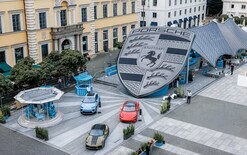Parties slam clean-car plans

National has vowed to scrap the rebates and feebates being introduced by the government, describing the measures as a “car tax”.
Michael Woodhouse, the party’s transport spokesman, says Labour’s clean-car policies are making motoring more expensive for people unable to switch to an electric vehicle (EV) and at the same time pushing up the price of such cars.
Rebates of up to $8,625 are available for battery electric vehicles (BEVs) and plug-in hybrids (PHEVs) registered after July 1, while from next year a range of discounts or fees based on emissions levels will be levied on cars.
“EV importers have seen the price of a used electric vehicle increase by $3,000 only three days after Labour announced its ‘car tax’, almost matching the subsidy you could get from buying a used low-emission vehicle,” explains Woodhouse, pictured.
“It’s basic economics. If you’re giving someone more money to pay for a product it’s only going to drive up the cost.
“Most of the government’s subsidy will end up going directly into the pockets of Japanese used-EV exporters.
“Transport Minister Michael Wood’s officials were told exactly this by the industry, but the government ignored that advice.
“National will repeal Labour’s car tax.”
Woodhouse says the clean-car discount will force owners of utes to pay more despite there being no pure-electric options available to them at present and predicts most of that money will head offshore rather than staying in the New Zealand economy.
‘Tax grab’
ACT also says the feebate scheme risks turning into a “tax grab” after the matter was raised with Wood in parliament recently.
Leader David Seymour says: “The policy is promoted as taking money from those who buy higher-emission vehicles and giving it to those who buy EVs. But, asked what would happen if not enough people bought EVs, the minister said the government would keep the money and continue collecting the tax.
“Michael Wood agreed that the policy would stop paying out if the original $300 million float ran out because too many people had taken the EV subsidy. When asked if the opposite was true, would the government stop collecting the taxes on targeted vehicles in the event that there was more money coming in than going out, the minister said that wouldn’t happen.”
Seymour, pictured below, has also called on the government to reverse its decision not to offer an exemption for utes in the clean-car discount scheme when it comes into force in 2022.
“Tradies need utes for a variety of tasks and will still buy them,” he notes. “The feebate scheme just means they’ll face an extra tax to fund Teslas for wealthier car buyers.”






